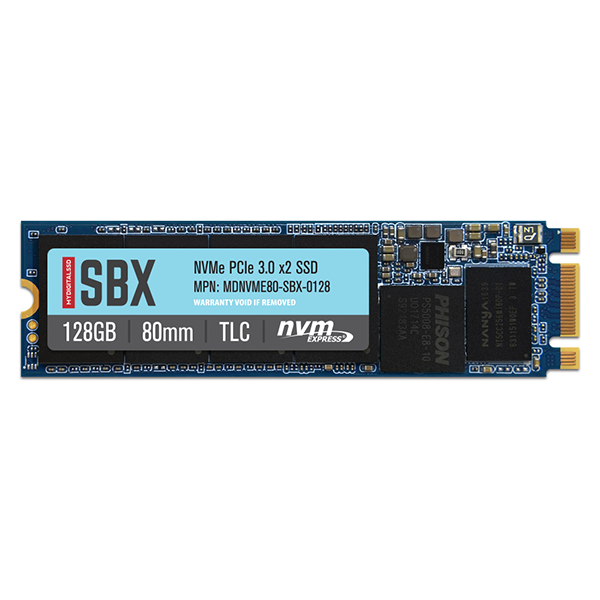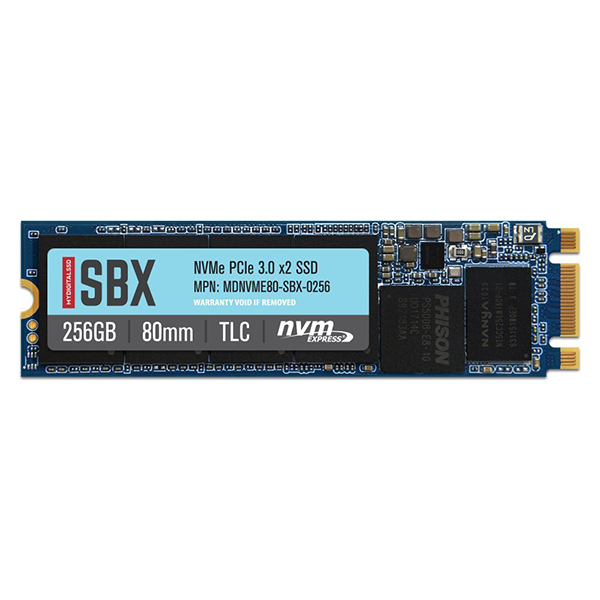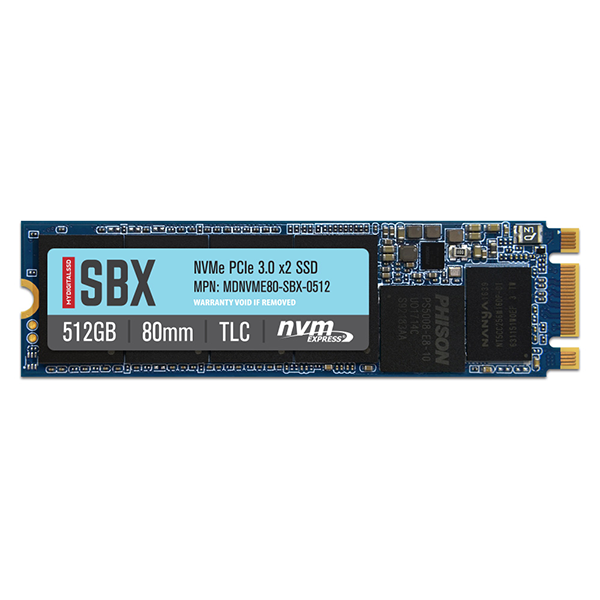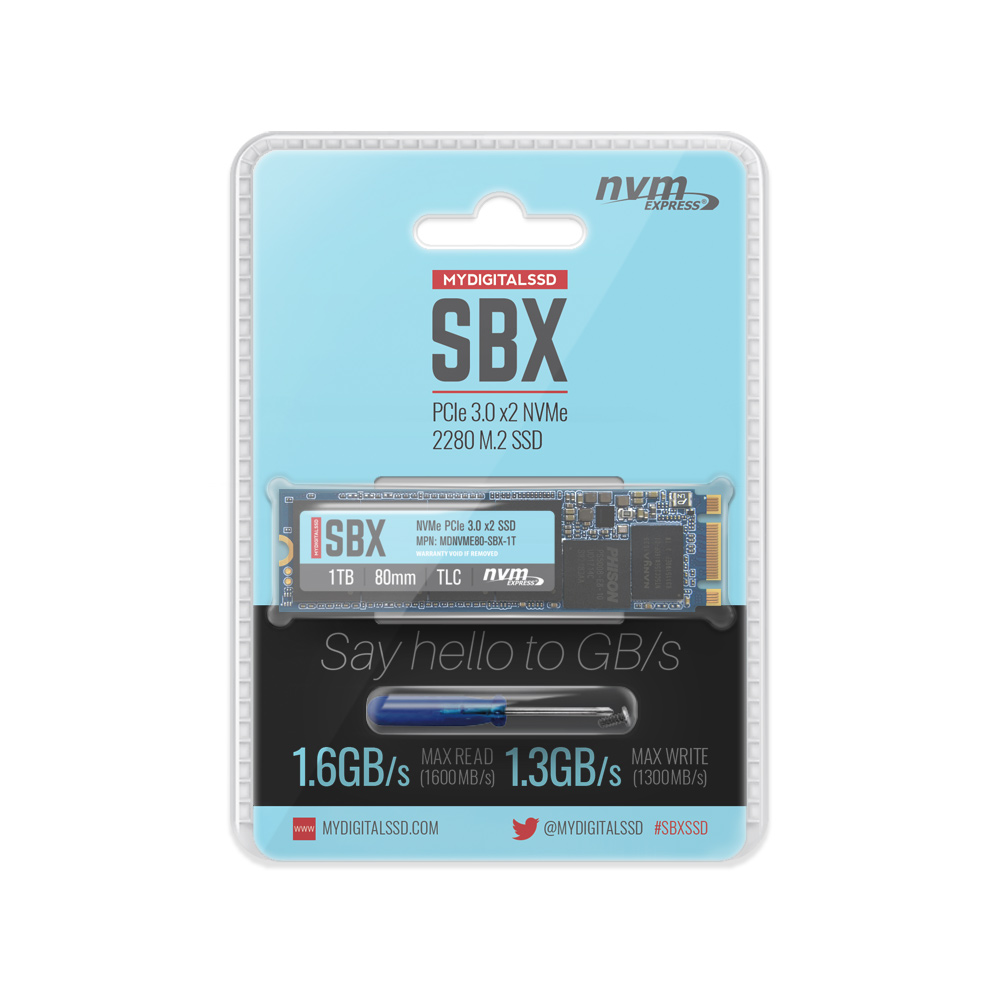Early Verdict
The largest SBX drive finally gives us a low-cost alternative to Intel's SSDs. The SBX delivers strong endurance, but it could use some firmware tuning to improve performance.
Pros
- +
High-capacity M.2 2280 NVMe SSD
- +
Low price point
- +
Faster than other "Entry-Level" NVMe products
- +
Solid mixed workload performance
- +
3D NAND for high endurance
Cons
- -
Struggles with power states
Why you can trust Tom's Hardware
Features & Specifications
MyDigitalSSD stands out from the rest when it comes to SSDs based on Phison Technologies' controllers. MyDigitalSSD is known for its disruptive products and has had a string of successes, but now it's ready to shake things up again with a new entry-level SSD.
Most people don't know MyDigital's history, but it's a feel-good story that resonates with people that cheer for the underdog. The CEO Matt Dawson began his quest with a simple problem–he wanted to reduce the amount of time it took to transfer photographs from his storage media. He began by researching products in forums and chat groups. Not satisfied with domestic storage products, he learned more about the inner workings and how to increase performance. In early 1999, Dawson found his solution and partnered with a company in Taiwan. To get started, Dawson sold his car and nearly everything else he had. He even borrowed money from friends and family to build inventory. Finally, he opened a web store and brought new specialty flash-based products to the American market.
The Compact Flash cards from MyDigitalDiscount were several times faster than the off-the-shelf products sold in big box stores. The products became popular as word spread and professionals took notice.
By 2006, MyDigitalDiscount had experience and employees. Put off by soaring prices, low performance, and weak availability, the company again looked East to find emerging technology that could outperform hard disk drives. At the time, SSDs were available, but good SSDs were rare. The company saw an opportunity to work with controller design houses and manufacturing companies to make its first house brand SSD under the MyDigitalSSD name.
High capacity flash storage was new for many of us, but Dawson was a seasoned industry vet. He helped companies bring products to market, recommended changes to decrease manufacturing and development costs, and still ran a successful store based in upstate New York while traveling back to Asia every few weeks.
Over time, the house brand grew beyond the limits of the house. Now MyDigitalSSD products sell at other online and retail stores worldwide. The brand hasn't risen to the same level as Intel, Corsair, or many of the others we often see on these pages, but that's also by design. The company doesn't invest a lot of resources in marketing, which helps it maintain its low pricing. Over the last few years, we've routinely seen the MyDigitalSSD BPX sell for 1/3 the price as similar SSDs from Corsair, Patriot, and others. Staying lean allows the company to build and maintain personal relationships with its customers, and the low prices keep them coming back.
Specifications
MyDigitalSSD plans to bring the SBX to market in four capacities. The drives range from 128GB to 1TB (1024GB) and use Toshiba's 64-layer BiCS 3D NAND. The MyDigitalSSD lineup is evolving as the market moves deeper into 3D NAND. The Phison E8 SSD controller will power the company's entry-level and mainstream products until the E8T DRAMless variant comes to market. The Phison E7 controller powers the previous-generation BPX models. That controller doesn't support 3D NAND, so the popular BPX will eventually reach end of life status.
Get Tom's Hardware's best news and in-depth reviews, straight to your inbox.
Essentially, SBX SSDs are the carrot to move away from SATA SSDs for new system builds. They also serve as upgrades for three-year-old computers that support the NVMe protocol.
The drive offers 240,000/180,000 random read/write IOPS, which is nearly as fast as the BPX with MLC NAND. It also delivers up to 1,600/1,300 MB/s of sequential read/write throughput. In contrast to many other current NVMe SSDs, the SBX has a PCIe 3.0 x2 interface instead of x4. Most Z97 motherboards only dedicate two lanes to the onboard M.2 port, so the SBX is a good fit for older systems. The drive also works with newer motherboards that support PCIe 3.0 x4 M.2 connections.
A two-lane controller is easier to design, which reduces research and development costs. The goal is to pass the savings on to the customer. The x2 interface does reduce burst performance in some situations, but it also has benefits. Two active lanes should consume less power than four lanes. Phison has struggled with power consumption in NVMe designs, though, particularly with the E7 controller. The company has yet to program in all of the power states that reduce power consumption at idle. The E8 controller in the SBX could be one of the best NVMe SSDs for notebook use if Phison programmed it to take advantage of all the low power states. It will take an effort to get it there, but I'm not sure if Phison will put in the work to make it happen.
Features
The MyDigitalSSD SBX does bring several useful features with it. We covered the new Phison PS5008-E8 (E8) controller in detail in our technical preview editorial.
- 3D TLC NAND Flash
- NVM Express 1.2 Interface
- PCI Express Gen 3 x2
- M.2 Form Factor
- Single Sided: 80 x 22 x 2mm
- Thermal Throttling
- End-to-End Data Path Protection
- Built-in Static & Dynamic Wear Leveling
- Bad Block Management
- StrongECC (SECC)
- SmartECC & SmartECC Refresh Support
- Power Saving Modes Supported: APST, ASPM, & L1.2
- Power Loss Protection with GuaranteedFlush
- Secure Erase
- SMART & TRIM Support
- Windows, OSX, & Linux Support
- Five-year Limited Warranty
StrongECC is a new trademark name for Phison's improved BCH error correction and control technology. We're told the technology is just as effective as LDPC (Low-Density Parity Check) technology.
Pricing, Warranty & Endurance
The 128GB SBX retails for $62.99 on Amazon. Savvy shoppers can head over to MyDigitalDiscount for an 11% price reduction. The 256GB sells for $99.99, and the 512GB model goes for $184.99. The 1TB model retails for $339.99.
| MyDigitalSSD SBX | 128GB | 256GB | 512GB | 1TB |
| Endurance (TBW - Terabytes Written) | 120 | 200 | 375 | 800 |
All SBX SSDs carry a five-year warranty that's limited by the amount of data you write to the drive. Unlike Intel's 600p and some other drives, the MyDigitalSSD SBX will not go into a read-only mode after reaching the endurance limit. Also, the endurance specification is conservative. As an example, Phison's internal testing shows the 512GB model can withstand up to 439 TBW with the JEDEC consumer test.
Packaging
MyDigitalSSD uses the same style of packaging for the SBX that it used for the BPX. The drive ships in a retail-ready blister pack. You get the drive, a small screwdriver, and a fine-threaded screw that uses a universal pitch for M.2 motherboards and notebooks.
A Close Look
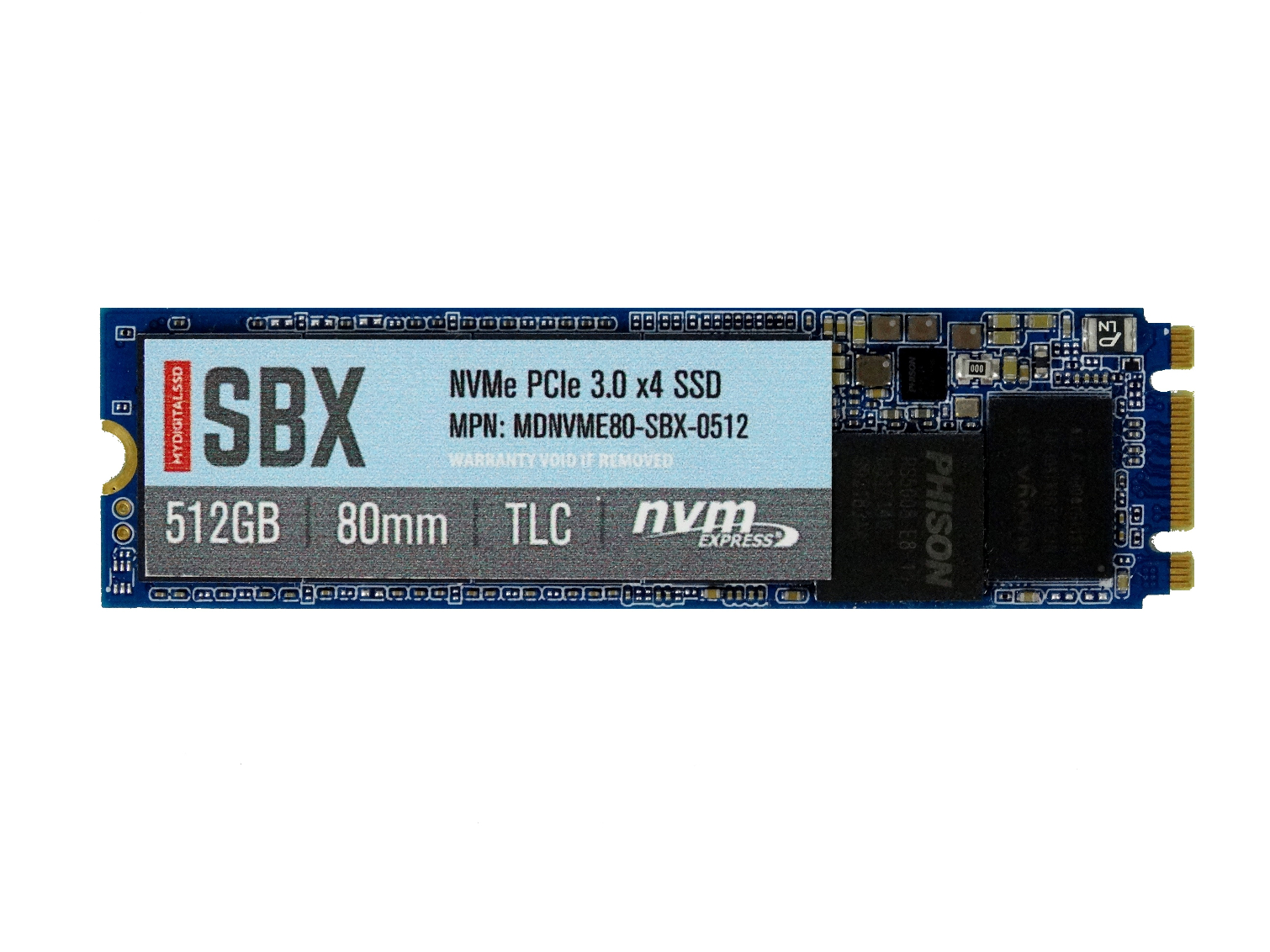
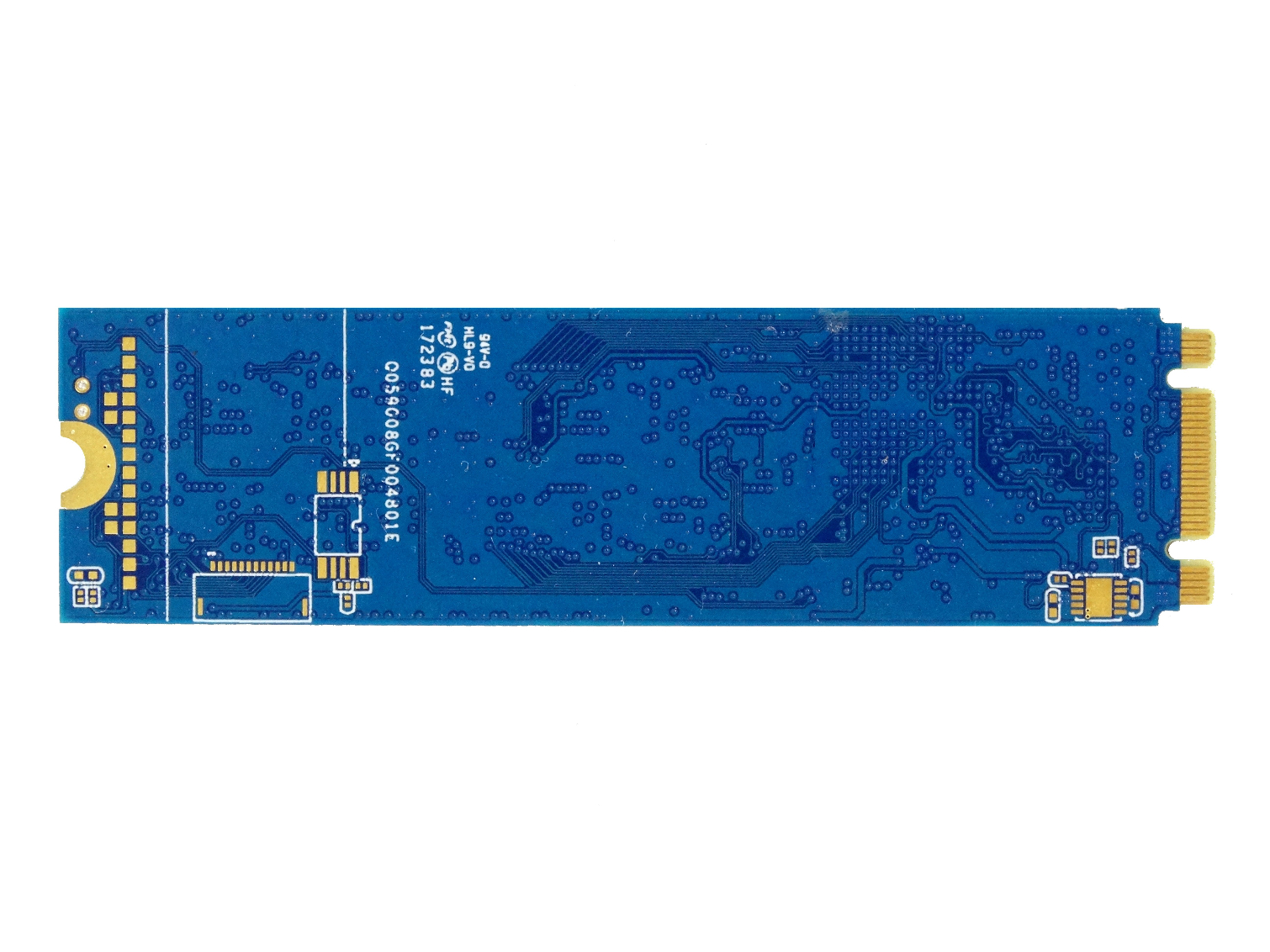
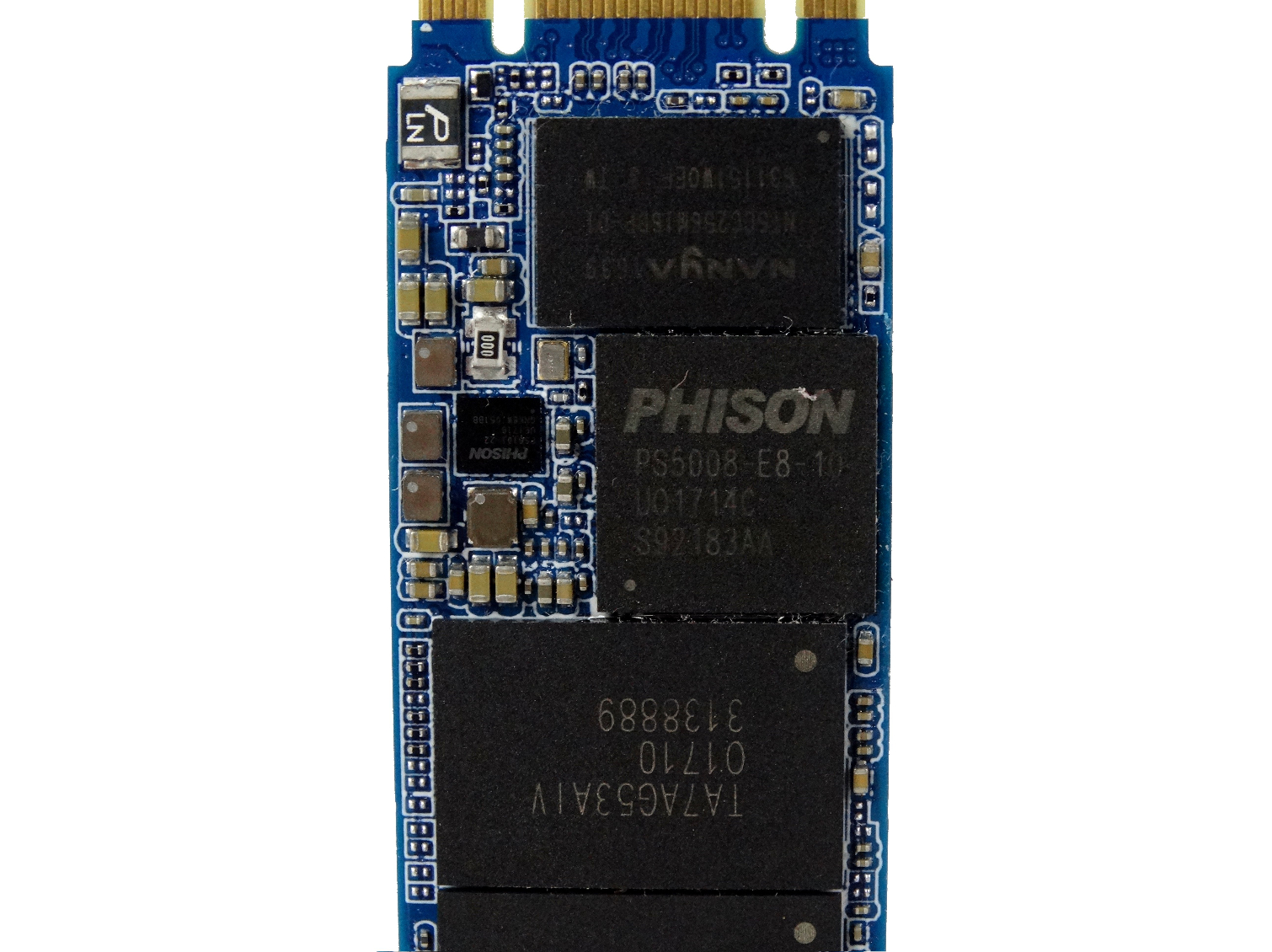
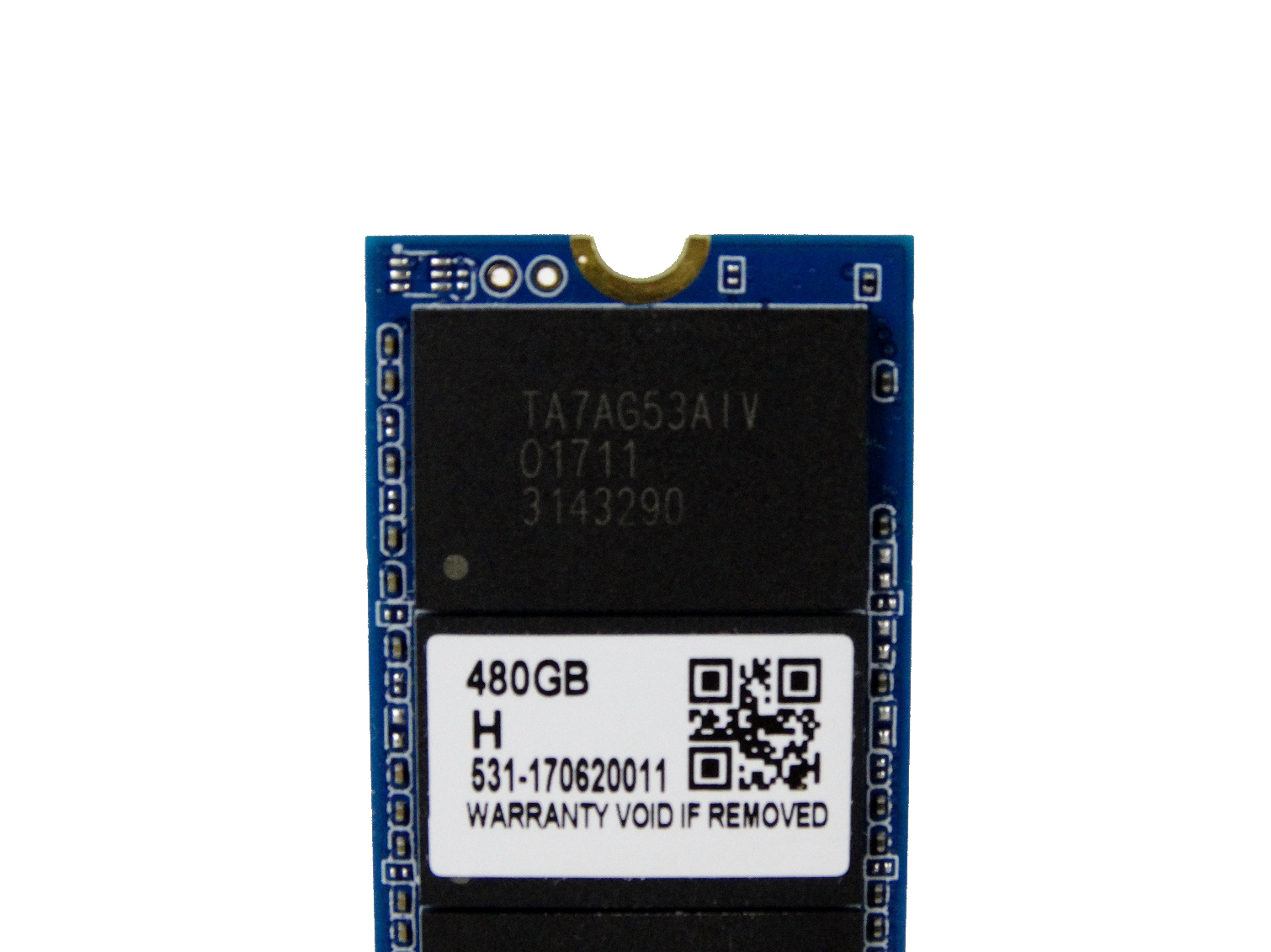
MyDigitalSSD uses the M.2 2280 single-sided design for all four capacities. The components are all on one side of the PCB, so you won't have to worry about notebook compatibility. In the past, some notebook manufacturers placed other chips under the M.2 slot to save space, which didn't leave enough room for a double-sided SSD. This was a rare issue for notebooks in general, but the models that could only accept a single-sided SSD were popular.
The Phison E8 controller is physically smaller than the E7 it replaces. The DRAM package is so close to the controller that the two are nearly touching. On the other side, we found four NAND packages with one assigned to each channel on the controller.
MORE: Best SSDs
MORE: How We Test HDDs And SSDs
MORE: All SSD Content

Chris Ramseyer was a senior contributing editor for Tom's Hardware. He tested and reviewed consumer storage.
-
2Be_or_Not2Be Nice review! There are always products that could have been included, like the Intel 760p.Reply
Yeah.... based on the performance & overall picture - it's a "pass" for me. I'd stick with the BPX or the other higher performing NVMe drives. -
Brian_R170 Totally agree on the Intel 760p missing from the comparisons. Curiously enough, if you go look at the 512MB 760p review from a few weeks ago, the MyDigitalSSD SBX is included on a couple of the Bapco graphs, yet the 760p is completely missing from this review. The 512GB 760p appears to be a much better performing product all around and especially at low queue depths, but with a very similar price.Reply -
CRamseyer Reply20734629 said:MyDigitalSSD is the first out of the gate with a retail Phison E80-powered SSD. The SBX is the entry-level successor to the popular BPX and brings more performance to the table.
MyDigitalSSD SBX NVMe SSD Review : Read more
CES played games with our release schedule and the 760p wasn't available when we wrote this one. Going forward both drives will be in the low-cost NVMe charts. -
Kennyy Evony Other drives are not included because this is a paid advertisement by mydigitalssd and they want to make you forget about competition.Reply -
CRamseyer Wait, I thought it was only Intel that paid off Tom's Hardware?Reply
We dropped the ball here but not because we were paid, loyalty to a company or anything nefarious.
I'm dealing with this issue right now in another article that covers RAID. I have to write one today but I can't include another product that is under NDA and coming in a couple of weeks. One article has a NDA date and the other doesn't. Ideally, the non-NDA review will come out first but something may come up, like other NDA reviews in other categories. It happens sometimes.
If you look back at the timing, we had the two CPU vulnerabilities and every project came to a standstill to figure out your exposure. What was the number one reported performance issue in the early news cycle? Storage performance. Sprinkle in CES and it was a perfect storm that we rarely encounter.
-
daglesj The ADATA SX6000 128GB NVMe will push 680MBps Seq Writes and will probably be cheaper.Reply -
ev3rm0r3 For that price point, why.... my 2 year old 961 still lays this down without thinking about it. Call me not impressed with new drives and their price tags.Reply -
jpe1701 I just picked one up for a game drive. They are down to sata prices over on mydigitaldiscount. I have a pm961 for my os and app drive so I didn't need anything that fast for my second slot.Reply

